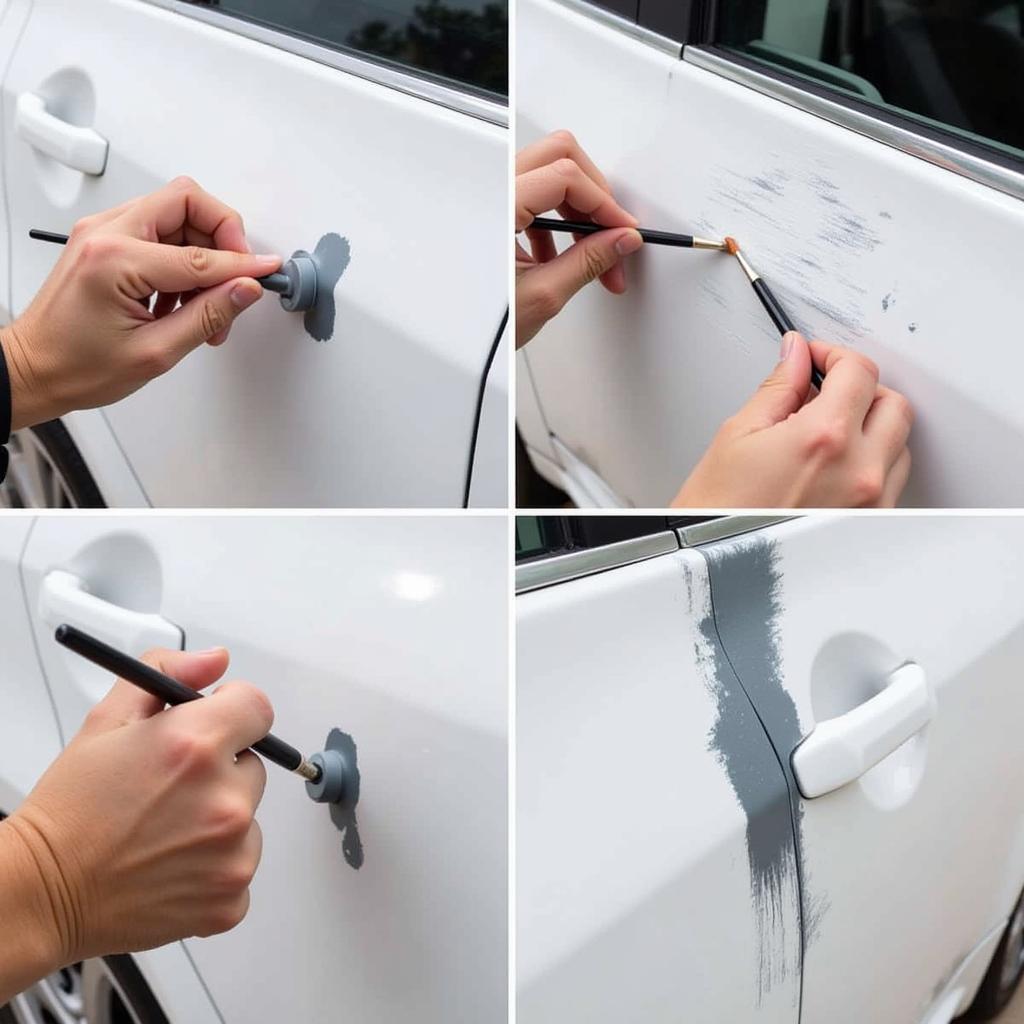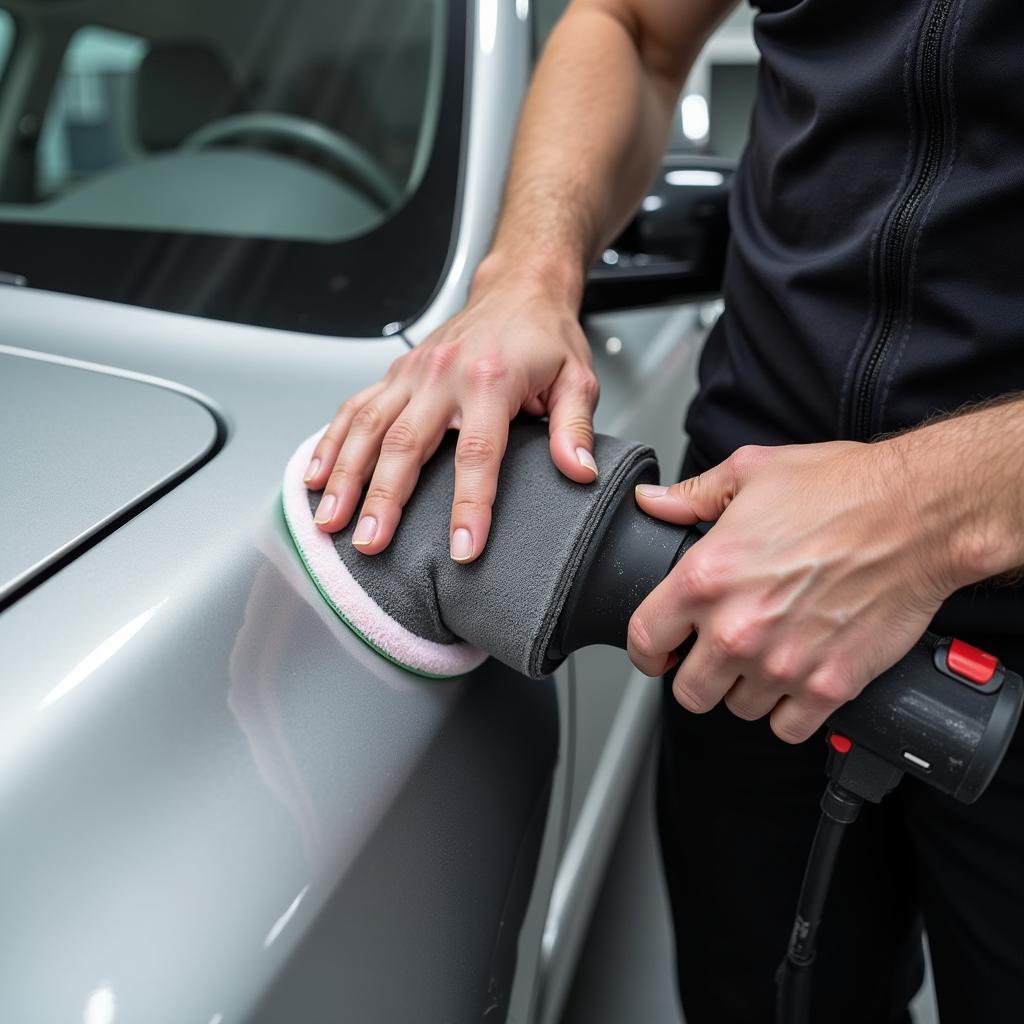Car scratches are an unfortunate reality of car ownership. Whether it’s a minor scuff from a shopping cart or a deeper gouge from a key, these blemishes can detract from your car’s appearance and even affect its resale value. But the good news is, in most cases, yes, car scratches can be repaired. Understanding the nature of the scratch and the repair options available is key to restoring your car’s finish.
Repairing car scratches ranges from simple DIY solutions to professional interventions, depending on the severity. This article will guide you through identifying the type of scratch you have, exploring the various repair methods, and helping you determine the best course of action for your specific situation. From minor clear coat scratches to deep paint damage, we’ll cover it all. Knowing how to assess and address car scratches empowers you to maintain your car’s appearance and protect your investment. Let’s dive in.
Types of Car Scratches and How to Identify Them
Understanding the depth and extent of the damage is the first step in determining the appropriate repair method. Generally, car scratches fall into one of three categories:
- Clear Coat Scratches: These are the most superficial, affecting only the clear coat, the protective layer on top of the paint. They often appear as light, swirling marks and can sometimes be felt with a fingernail.
- Paint Scratches: These penetrate through the clear coat and into the colored paint layer. They are more visible than clear coat scratches and often appear as a lighter color than the surrounding paint.
- Deep Scratches: These reach the primer or even the bare metal beneath the paint layers. They are the most serious type of scratch and are highly susceptible to rust.
Correctly identifying the type of scratch is crucial. Misdiagnosing a deep scratch as a surface scratch can lead to ineffective DIY repairs and potentially worsen the damage.
You might be interested in learning how to repair plastic car bumpers if the scratch extends to your bumper.
DIY Car Scratch Repair: Methods and Materials
For minor clear coat and light paint scratches, DIY repair is often a viable option. Several methods and materials are available, including:
- Scratch Remover Products: These are specially formulated compounds designed to fill in and level out minor scratches. They are readily available at auto parts stores.
- Rubbing Compound: This is a more abrasive solution for slightly deeper scratches. It requires careful application to avoid damaging the surrounding paint.
- Touch-Up Paint: For paint scratches, touch-up paint can be used to fill in the damaged area. Precise application and blending are essential for a seamless repair.
 Applying Touch-up Paint to a Car Scratch
Applying Touch-up Paint to a Car Scratch
When attempting DIY repairs, remember to work in a clean, well-lit area and follow product instructions carefully. If you’re unsure about any step, consulting a professional is always recommended. Sometimes, seemingly minor damage might be more extensive than it appears, and incorrect DIY methods can exacerbate the problem.
Professional Car Scratch Repair: When to Seek Expert Help
While DIY repairs can be effective for minor scratches, deeper scratches or those involving significant paint damage often require professional attention. A professional auto body shop has the expertise and tools to address complex repairs, including:
- Wet Sanding: This technique uses progressively finer sandpaper to level out the damaged area before repainting.
- Repainting: For deep scratches or extensive paint damage, repainting the affected panel may be necessary to restore the original finish.
 Wet Sanding a Car Scratch
Wet Sanding a Car Scratch
If the damage extends beyond just scratches, you might need more extensive repairs, such as those outlined in our guide on how to repair a car front. Knowing the cost implications of such repairs is important, and you can find helpful information on how much it costs to repair car bumpers in our dedicated article.
Preventing Car Scratches: Protective Measures
Prevention is always better than cure. Several measures can help protect your car from scratches:
- Regular Washing and Waxing: This helps create a protective barrier against minor abrasions.
- Parking Strategically: Avoid parking in high-traffic areas or close to shopping carts.
- Car Covers: Using a car cover can shield your car from environmental factors and accidental scratches.
Considering the costs involved in car repairs, you might be wondering about the value of car repair insurance. Our article, is car repair insurance worth it, explores this topic in detail. Furthermore, if you own a Suzuki Swift and are curious about repair costs, we have a dedicated guide on how much to repair car swift.
Conclusion
Can Car Scratches Be Repaired? Absolutely. From minor scuffs to deep gouges, solutions are available to restore your car’s appearance. By understanding the types of scratches and the repair options available, you can make informed decisions and keep your car looking its best. Whether you choose a DIY approach or opt for professional assistance, addressing car scratches promptly can prevent further damage and maintain your car’s value.
FAQ
- Can I use toothpaste to remove car scratches?
While some claim toothpaste can buff out minor scratches, it’s not a recommended solution. It can be abrasive and may cause more harm than good. - How much does professional car scratch repair cost?
The cost varies depending on the severity and location of the scratch. Minor repairs can start from around $50, while more extensive damage may require several hundred dollars. - Can I repair scratches on my car’s plastic bumper myself?
Yes, minor scratches on plastic bumpers can often be repaired using DIY methods like plastic repair kits. - How can I prevent car scratches in a parking lot?
Parking further away from other cars and avoiding high-traffic areas can help minimize the risk of scratches. - What should I do if I find a deep scratch on my car?
It’s best to consult a professional auto body shop for deep scratches to assess the damage and determine the appropriate repair method. - Can I wax my car after repairing a scratch?
Yes, waxing your car after a scratch repair can help protect the repaired area and restore the shine. - How long does touch-up paint take to dry?
Touch-up paint typically takes a few hours to dry completely.
Need help with your car? Contact us via WhatsApp: +1(641)206-8880 or Email: [email protected]. We have a 24/7 customer support team ready to assist you.

Leave a Reply